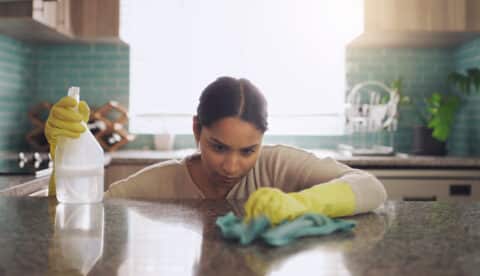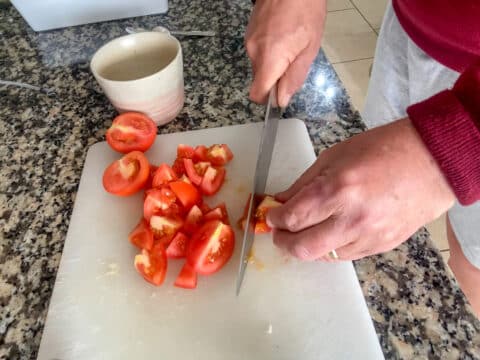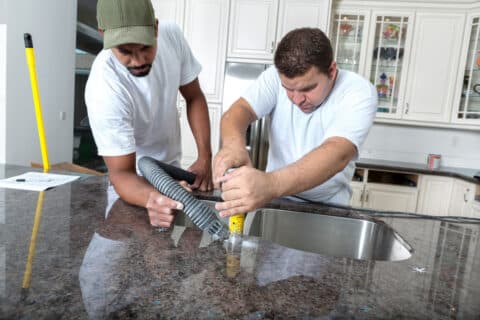What Is the Best Way to Maintain Granite Countertops?
The increasing popularity of granite countertops has accelerated the stone industry. People are using granite in their kitchens, bathrooms, living rooms and powder rooms. Granite countertops are aesthetically appealing while offering durability and practicality. They are not easily chipped or damaged and are relatively easy to maintain.
We all know that if we take care of something, it lasts longer. Stone is no different. Treating your granite countertops with proper care and maintenance will keep them in their best condition and maintain their longevity.
Understanding Granite Countertops
Granite is one of the strongest and most durable stones to exist. It has a natural tolerance of heat which is why many people gravitate to using it for a countertop surface.
Granite countertops are relatively easy to care for and maintain. This is one of its most attractive traits. The best way to maintain granite countertops is by keeping them clean and taking preventive measures.
The preventive measures we recommend you take include short term maintenance such as daily clean up, as well as long term maintenance routines. We will break down each of these and educate you on the best way you can maintain your granite countertops.
Daily Cleaning and Maintenance of Granite
A general guideline for daily cleaning routines includes:
- Clean spills or messes as they occur
- Avoid acidic or high pH liquids
- Blot, don’t wipe (oil, grease and acidic spills)
- Use only a stone safe cleaner
- Avoid abrasive tools and techniques

Daily Cleaning and Maintenance of Granite
Messes and spills should be cleaned promptly to avoid staining or etching. Oil, grease, acidic based, or pigmented substances can stain some granites if not immediately removed. Instead of wiping a spill, you should blot it with a paper towel to avoid the spill from spreading. Then rinse the area with soap and water using a soft cloth.
When cleaning messes or spills, it’s important to choose the correct cleaning products. Some of these products have harmful chemicals that can be damaging to the surface. We recommend using a mild soap and water mixture for daily clean up or a stone intended cleaner for an extra polish.
Many times, people rush to use harsh chemicals or abrasives like scouring powders for hard messes or spills without thinking of the after effects. You should avoid these as much as possible to protect your stone so it can last years to come. Make sure you know exactly what you are putting on your stone’s surface before applying it.
Using non-abrasive tools and techniques will help to prevent scratches, chips or any wearing on the sealant. When cleaning your countertop, you should only use a non-abrasive cloth or sponge.
After cleaning your granite or natural stone countertop, it’s important to then dry the surface, especially if it’s significantly wet. Liquids can seep through the surface if left repeatedly or for a long period of time.
Long-Term Granite Maintenance
Depending on the place and usage of your granite countertops, long-term maintenance can vary. There are tips for preventing damage and prolonging your stone’s longevity, such as:
- Avoid harsh chemicals and abrasives
- Use cutting boards and trivets
- Regular sealings
Harsh chemicals and abrasives can become harmful to your stone surface. Even if they do not appear to damage your countertops at first, over time they can permanently stain your natural stone.
Substances you should avoid include:
- Cooking grease
- Acidic liquids such as lemon juice
- Red wine
- Vinegar
Chemicals you should avoid include:
- Paint remover
- Hydrochloric acid
- Degreaser
- Ammonia
- Construction adhesives (plumber’s or painter’s putty)
Using only stone safe products and neutral substances is the best practice to help prevent blemishes or damage from occurring.
 Another way to maintain your stone countertops is to avoid cutting directly on them. This will prevent you from scratching its surface or sealant. Not only this, but the hardness of the stone can dull your kitchen knives. In addition, it’s also recommended to place a trivet or hot plate between your countertop and any heat source. Granite absorbs heat and can become hazardous for burning you or someone else. High heat temperatures can also weaken the effectiveness of the sealant.
Another way to maintain your stone countertops is to avoid cutting directly on them. This will prevent you from scratching its surface or sealant. Not only this, but the hardness of the stone can dull your kitchen knives. In addition, it’s also recommended to place a trivet or hot plate between your countertop and any heat source. Granite absorbs heat and can become hazardous for burning you or someone else. High heat temperatures can also weaken the effectiveness of the sealant.
Stone is meant to last, and it lasts even longer when well cared for. Avoiding these things in general will protect the condition and beauty of your granite countertops long-term.
Sealing Your Granite
A sealant is an invisible barrier that will protect your natural stone countertop from liquids breaching the surface and inflicting damage such as staining or etching. It is a precaution that can save you money in the long run.
No matter who installs your granite countertops, it’s important that they are properly sealed. A good fabricator will typically seal your granite countertops prior to installation for a base protectant. Premium sealants should be applied by professionals, but there are a few sealants you can buy from the store. Keep in mind that not all sealants are intended for natural stones.
A sealant is sprayed or wiped evenly onto the stone and left to be absorbed into the surface. Any excess is then wiped away. Additional coats can be applied as needed.
Even if your granite countertops were given a sealant upon installation, it’s important that they be resealed regularly or relative to their use. The sealant can wear as time goes on, which makes it less effective compared to when it was first applied.
Troubleshooting and Restoration
If you notice scratches or dullness on your stone countertops, there are a few steps you can take to address this. First, identify if the scratch broke through the sealant barrier. If only the sealant scratched, it can be reapplied.
Some special care considerations and strategies we suggest to restore the natural beauty of your stone’s shine include applying a stone polishing paste. A polishing paste or cleaner can be found at a home improvement store. In addition, creating a simple poultice mixture is good for stain removal. Poultice can be made using typical household ingredients following this recipe.
STONE POULTICE RECIPE:
- Hydrogen peroxide-40% by volume
- Gloves
- Unscented baby powder or talcum powder
- Plastic cup
- Plastic wrap
- Razor blade
- Masking tape
- Plastic putty knife
- Stirrer stick
STEPS:
- Pick a test area (approx. 16″x16″) that has the most damage or staining to it.
- Combine the peroxide and the baby powder in the cup and mix until it is a paste about the consistency of peanut butter.
- Apply the paste to the stained area with the putty knife- about 1/4″ thick.
- Cover the area with plastic wrap.
- Tape down the edges using masking tape.
- Use the razor blade to cut one or two slits in the plastic so it can breathe.
- Allow the paste to stay on the counter for 24 hours.
- After 24 hrs., use the plastic putty knife to scrape off the now dried paste.
- Rinse the work area with water and dry with a paper towel.
- After the surface is completely dry, compare the test space to the rest of the counter and evaluate your progress.
- You should see a distinct difference.
- Repeat the process in sections of the counter until desired result is achieved.
Note ** Remember to wear your gloves!
The rule of thumb with poulticing is “if the stain can go in, then it can come out.” If using this and a little elbow grease does not do the trick, we recommend seeking professional help.
Professional Restoration
 In some scenarios, professional restoration services are recommended. Invasive scratches or dullness can be buffed out and re-polished to return the shine and luster to your granite surface. Any cracks or chips can be restored using a resin similar to the color of your stone. These techniques should be done by a team of experienced professionals.
In some scenarios, professional restoration services are recommended. Invasive scratches or dullness can be buffed out and re-polished to return the shine and luster to your granite surface. Any cracks or chips can be restored using a resin similar to the color of your stone. These techniques should be done by a team of experienced professionals.
Each stone material is different, and each supplier offers resources and warranties for their stone. We recommend registering a warranty on your stone to help fix or repair damages such as chips, scratches, staining, dullness, or blemishes where professional restoration would be necessary.
Granite and Marble Designs Can Help You Care for Your Granite Countertops
Becoming educated on the strengths and weaknesses of your stone material is important to understand how to properly care for it. The tips above should help you maintain beautiful countertops for years to come, but if you have specific concerns or need the assistance of a professional, Granite and Marble Designs can help. Our team provides a wide range of maintenance services to restore the beauty of your countertop. No matter how challenging the job, we can help you keep your countertops in great shape.
Visit our Care and Maintenance page for more information and tips on maintaining your granite countertops.
Contact us to get started on your next stone project or for help with maintenance of an existing granite countertop. Granite and Marble Designs serves customers in the Denver, Colorado area.
